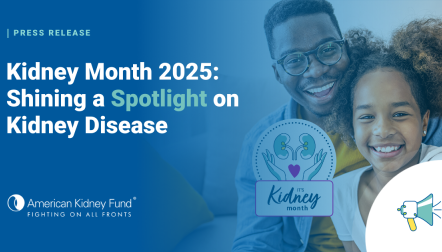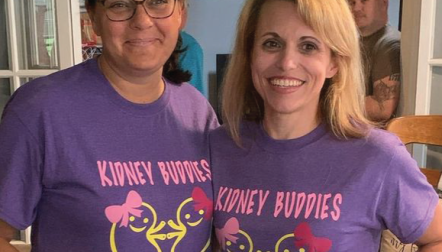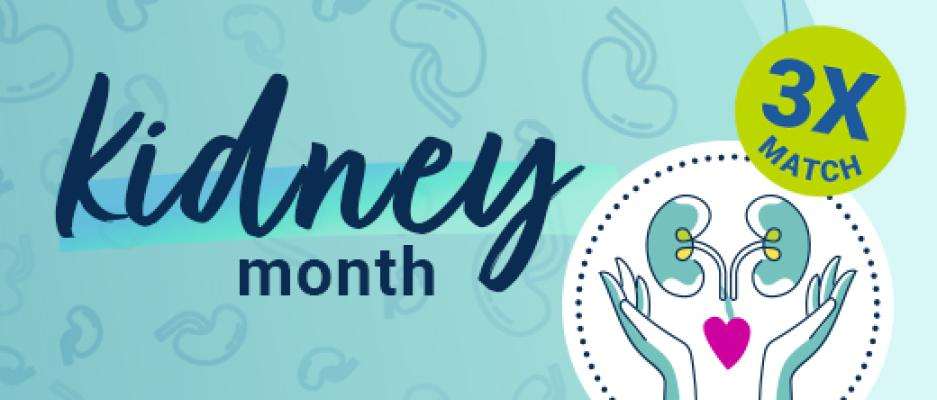
Blog post
Kidney Action Week Preview: Q&A with Dr. Joseph Melancon

As we gear up for the American Kidney Fund's 2023 Kidney Action Week, which will be taking place March 20-24, we're continuing to preview a few of the exciting sessions that are on the agenda for Kidney Action Week, one of the most comprehensive educational programs about kidney health for the entire kidney community!
This annual, week-long event brings members of the kidney community together during Kidney Month for engaging and informative sessions to support kidney health. It is free and 100% virtual, so you can attend from anywhere you happen to be.
In all, our schedule has over 30 sessions you can attend throughout the week, including Q&As with several nephrologists (kidney doctors) on various topics, so you can have your questions answered by professionals. You can view our full agenda here.
In this blog post, we'll be previewing "Maintaining Health and Eligibility for a Kidney Transplant," which will be held Tuesday, March 21 at 6:30 p.m. ET with speaker Joseph Melancon, MD.
What is your connection to and experience with kidney disease?
I am a transplant surgeon and therefore I do kidney transplants. Because of this, I primarily see people with end stage renal disease. The distinction between a nephrologist (kidney doctor) and a transplant surgeon is that a nephrologist treats people with kidney disease and tries to improve their kidney function when they are diagnosed with chronic kidney disease. There are 5 stages of kidney disease, with stages 1 and 2 being more mild and stages 4 and 5 being more severe. While nephrologists treat people in the earlier stages and try to prevent them from getting to stage 5, I as a surgeon perform transplants for people once they get to stage 5.
What is one thing you wish more people knew or understood about kidney disease?
What I wish more people understood is that the development of kidney disease is a very long-term process that usually begins by not realizing an ongoing problem. For examples, if you regularly take ibuprofen, or some other over-the-counter pain reliever (other than acetaminophen) for a chronic back pain, headache, or other issue, this highly increases your risk of developing kidney disease. The two primary causes of kidney disease are high blood pressure and diabetes. Both diseases are regularly and routinely undiagnosed and undertreated.
Without giving too much away, what will you discuss in your Kidney Action Week session?
The secret to being the best transplant candidate possible is simply being the best surgical candidate possible — someone who listens to their doctor's advice, takes their medications, maintains a healthy weight and minimizes their comorbidities (i.e., heart problems or vascular problems).
Why should people attend Kidney Action Week?
Throughout the years, I have found that patients who attend educational seminars are more informed about kidney disease, which can lead to better health outcomes. Kidney Action Week provides a great opportunity for kidney disease patients to improve their health literacy, and therefore improve their health outcomes.
And why should people attend your session, specifically?
People should attend my session because they will get to hear from someone who will perform their transplant surgery, if needed. To hear from a variety of different perspectives, including a transplant surgeon's, how to maximize having the best transplant outcomes.
Joseph Melancon, MD, is chief of the Transplant Institute and Division of Transplant Surgery at The George Washington University Hospital in Washington, DC.
Kidney Action Week is supported by Presenting Sponsors Boehringer Ingelheim and Eli Lilly Co.; and Otsuka America Pharmaceutical, Inc.; and U.S. Renal Care and program sponsors Novartis Pharmaceuticals Corporation and Travere Therapeutics.


